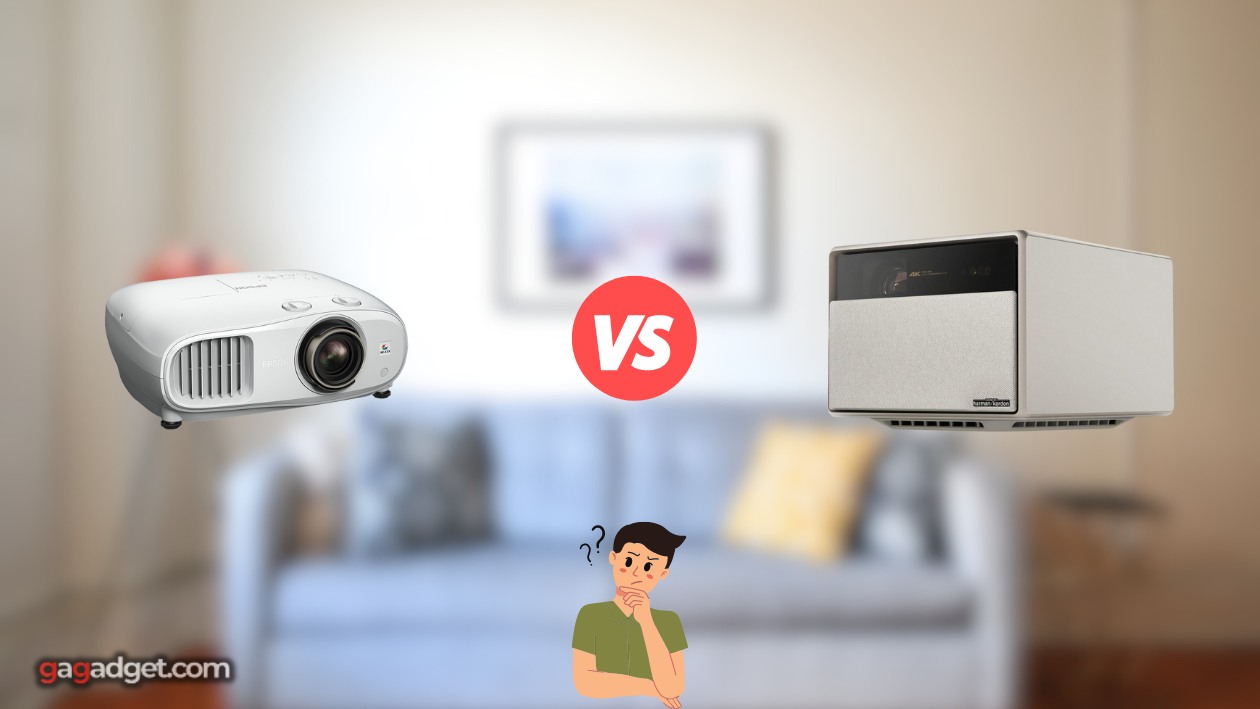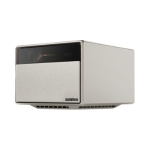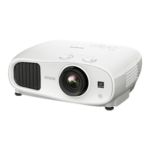At gagadget.com, your trust is our priority. We follow strict quality standards in our research, tests, and analysis of video projectors, to give you the best experience. Learn more
XGIMI Horizon Ultra vs Epson HC3800
Hey everyone, it's Jim. Today, I'm comparing two high-performance 4K projectors: the brand-new XGIMI Horizon Ultra and the popular Epson 3800. Both offer advanced image processing, HDR support, and flexible setup tools for an immersive big-screen experience. But they also have some key differences in display technology, smart features, gaming performance, and more.
I've spent quality time evaluating both projectors, watching movies, streaming shows, gaming, and testing overall usability. In this in-depth XGIMI Horizon Ultra vs Epson 3800 face-off, I'll share my hands-on experiences to help you decide which one best fits your home theater needs and expectations. Let's dive in!

XGIMI Horizon Ultra vs Epson 3800: Quick Overview
I respect your time and aim to provide only the essential information, skipping the fluff.
If you're in a hurry, here's my quick take: The XGIMI Horizon Ultra and Epson 3800 are both formidable 4K HDR projectors. The Ultra uses a single 1080p DLP chip with pixel shifting to achieve 4K, while the 3800 employs Epson's 3LCD tech with pixel shifting. Both are bright at 2300-3000 lumens and support the latest HDMI 2.0 and HDCP 2.2 standards.
The Horizon Ultra's advantages are its integrated Android TV, auto focus and keystone, longer 25,000-hour laser life, and lower 28dB fan noise. The Epson 3800 fights back with higher native contrast, wider zoom and lens shift, faster 20ms input lag for gaming, and a replaceable lamp.
For most users, I recommend the Epson 3800. Its superior installation flexibility, smoother 4K pixel shifting, higher contrast, and faster gaming response give it the overall edge for dedicated theaters and mixed-use spaces. But if you want a true all-in-one solution with smart streaming and more plug-and-play operation, the XGIMI Horizon Ultra is a compelling alternative.
Table of Contents
- XGIMI Horizon Ultra vs Epson 3800: Full Comparison
- Horizon Ultra or Epson 3800: Design
- XGIMI Horizon Ultra vs Epson 3800: Owner Reviews
- XGIMI Horizon Ultra and Epson 3800 Alternatives
- Should You Buy the XGIMI Horizon Ultra or Epson 3800?
XGIMI Horizon Ultra vs Epson 3800: Full Comparison
| Specs | XGIMI Horizon Ultra | Epson 3800 |
| Image |

|

|
| Resolution | 3840 x 2160 (4K w/pixel shifting) | 1920 x 1080 (4K w/pixel shifting) |
| Brightness (Lumens) | 2,300 (ISO) | 3,000 (ISO) |
| Display Type | DLP x1 | 3LCD |
| Input Lag (4K/60Hz) | 18ms | 20.6ms |
| HDR Formats | HDR10, HLG, Dolby Vision | HDR10, HLG |
| Dynamic Contrast | 1,000,000:1 | 100,000:1 |
| Zoom | 1.25x powered | 1.62x manual |
| Lens Shift | None | H ±24%, V ±60% |
| Lamp Life (Eco) | 25,000 hours | 5,000 hours |
| Built-in Speakers | 12W x2 Harman Kardon | 10W x2 |
| Android TV | Yes (v11) | No |
| Dimensions (W x D x H) | 8.6" x 8.5" x 6.5" | 16" x 13" x 6.5" |
| Weight | 11.5 lbs | 15.2 lbs |
| Release Year | 2023 | 2019 |
Starting with image quality, both projectors use pixel shifting to achieve 4K resolution from lower-res imaging chips. The Horizon Ultra has a single 1080p DLP chip that flashes 4 times per frame to create a 3840 x 2160 picture. The Epson 3800 employs three 1080p LCDs that are shifted diagonally by half a pixel to reach 4K.
In practice, the Epson's 3LCD system produces a slightly cleaner and more stable 4K image. Fine details like hair and fabric textures look a touch sharper and more natural, with less noise or artifacting. The Ultra's 4K shifting is still very good but I noticed some minor blur and judder in fast-moving scenes.
The Epson 3800 also has the edge in contrast and black levels. Its 100,000:1 dynamic ratio and 16-step iris do a better job preserving shadow detail and bright highlights within the same frame. The Ultra's 1,000,000:1 spec is impressive on paper but the difference wasn't as apparent in real viewing - blacks still looked a bit grayish in a fully dark room.
Where the Horizon Ultra pulls ahead is HDR performance, thanks to its Dolby Vision support. Compared to the Epson's HDR10 and HLG formats, Dolby Vision provides better scene-by-scene color and contrast optimization when viewing compatible content. The expanded color gamut and dynamic tone mapping give the Ultra's HDR images a bit more pop and depth.
Both projectors are very bright at 2300-3000 ANSI lumens. That's enough to power 150" screens in moderate ambient light. The Epson's extra 700 lumens provide some headroom for combating lighter-colored walls or curtains. But in most rooms, the Ultra's laser phosphor light engine produces equally punchy images while lasting much longer - up to 25,000 hours vs 5,000 on the 3800's lamp.
For gaming, the Epson 3800 has slightly lower input lag at 20.6ms vs the Ultra's 18ms in 4K/60Hz. That's not a huge difference but could matter for hardcore competitive play. Both are responsive enough for casual gaming across all genres. The Ultra's Game picture mode does boost contrast and motion but I didn't find it as impactful as some other gaming projectors.
Setup and installation is where the Epson 3800 really shines. Its 1.62x zoom and generous lens shift (+/- 24% horizontal, +/- 60% vertical) provide excellent placement flexibility for different screen sizes and positions. You can ceiling mount, shelf mount, or table top the projector and still get a squared, evenly focused image.
The Horizon Ultra has a smaller 1.25x zoom and no lens shift, relying instead on digital keystone correction up to 45 degrees. That's fine for casual spaces like a living room or bedroom but less ideal for dedicated theaters where you want every pixel mapped 1:1 to the screen. The Ultra's auto focus and keystone are handy for quick setup but manual adjustments on the 3800 offer more precision.
The Ultra does have a few unique tricks up its sleeve. The integrated Android TV and Google Assistant allow you to stream content and control the projector with just your voice - no extra devices needed. The dual 12W Harman Kardon speakers are also a big step up from most projector audio, with good clarity and impact for casual viewing.
Aesthetically, the Horizon Ultra sports a more modern and lifestyle-friendly design. The sleek gray chassis with fabric grille looks great on a coffee table or media stand. The Epson 3800 has a utilitarian white case that's meant to blend into a ceiling. Both are relatively compact for their brightness class but the Ultra is easier to move around at 11.5 lbs vs 15.2 lbs.
Horizon Ultra or Epson 3800: Design
The XGIMI Horizon Ultra and Epson 3800 take very different approaches to their aesthetic and industrial design. The Horizon Ultra embraces a modern, minimal look while the Epson 3800 has a more traditional projector silhouette.
XGIMI Horizon Ultra Design
Epson 3800 Design
The Horizon Ultra features a compact rectangular shape with rounded corners and straight edges. The top panel is perforated gray metal while the sides are wrapped in black fabric, concealing the speakers. Copper accents around the lens and air vents add a touch of elegance. Overall, it looks more like a smart speaker than a projector.
In contrast, the Epson 3800 sports an angular white plastic shell with visible cooling vents on the sides and front. The offset lens is surrounded by gray panels containing the IR receiver, status lights, and manual controls. It's a functional, no-nonsense design that doesn't draw too much attention.
The Ultra is significantly smaller at 8.6" W x 8.5" D x 6.5" H and lighter at 11.5 lbs. That makes it easier to transport from room to room or stow away when not in use. The 3800 is more of a permanent install at 16" W x 13" D x 6.5" H and 15.2 lbs. But its rounded edges and rear cable cover do help it look less obtrusive on a ceiling.
Build quality feels substantial on both units, with no flexing or creaking. The Ultra's metal and fabric construction imparts a more premium, durable impression than the 3800's all-plastic body. But I wouldn't worry about either one holding up to the rigors of daily use.
The Ultra's main design advantage is ease of setup. Once you place it in front of your screen or wall, the auto focus and keystone correction take care of sizing and squaring the image. The 3800 requires physically adjusting the zoom and lens shift, then manually dialing in focus. It's not difficult but takes a bit more time and care.
Around back, the connectivity options are similar. Both have dual HDMI 2.0 ports (HDCP 2.2), optical audio out, and USB for power or firmware updates. The Epson adds a VGA input and RS-232 for integration with a home theater control system. But the Ultra's built-in Android TV and WiFi eliminate the need for external streaming devices.
The included remotes also reflect each projector's design ethos. The Ultra's is a slim black wand with minimal buttons and a circular navpad in the center. The 3800's is a chunky white model with clearly labeled controls for every function. Both get the job done but the Ultra's looks and feels higher-end.
XGIMI Horizon Ultra vs Epson 3800: Owner Reviews
Since the XGIMI Horizon Ultra was just released, there aren't many owner reviews available yet. But early impressions from testers and reviewers are very positive.
XGIMI Horizon Ultra Owner Reviews
Praises: "The 4K picture is incredibly sharp and detailed, especially with native 4K content. Colors are vibrant but still accurate and skin tones look very natural."
"I love the Android TV integration - it's so convenient to stream my favorite shows without plugging in a separate stick or box. The Google Assistant voice control also works great for searches and basic commands."
***
Drawbacks: "Black levels are only average - in a totally dark room, shadow areas look more like dark gray than true black. An ALR screen helps but native contrast is just decent."
"The auto focus and keystone are a bit hit or miss. Sometimes it nails the geometry right away, other times I have to fiddle with manual settings to get the edges straight. A proper optical zoom would be even better."
Epson 3800 Owner Reviews
Praises: "The lens shift and zoom are fantastic for dialing in the perfect image. I have my screen mounted a bit off-center but the wide adjustments let me place the projector almost anywhere."
"This is a light cannon - even in moderate ambient light, the picture still looks bright and punchy on my 135" ALR screen. I don't miss my TV at all for daytime viewing."
***
Drawbacks: "The pixel shifting 4K isn't quite as tack-sharp as my native 4K TV. It's pretty darn close and still looks great, just a bit softer in fine details like text and distant objects."
"Fan noise is audible in high lamp mode, especially during quiet scenes. Eco mode helps a lot but also dims the picture a fair bit. I wish Epson offered a middle ground or smarter auto iris."
Overall, Epson 3800 owners are very satisfied with the projector's brightness, flexible installation, and overall image quality for the price. Many praise the accurate colors, good HDR tone mapping, and crisp upscaled 4K in a variety of lighting conditions. The wide lens shift and zoom are also frequently cited as helpful for tricky room layouts.
The main complaints are about the slightly soft pixel-shifted 4K vs true native 4K projectors, and the noticeable fan noise in higher lamp modes. But most feel the 3800 delivers excellent big-screen bang for the buck, especially for mixed movie and gaming use.
XGIMI Horizon Ultra and Epson 3800 Alternatives
If you're not quite sold on the Horizon Ultra or 3800, here are a couple other capable 4K projectors to consider in the same general price range:
- Optoma CinemaX D2 Smart: An ultra-short throw DLP projector with 3,000 lumens, a laser light source, Android TV 10, and a 0.25:1 throw ratio for images up to 120" from just inches away - great for living rooms and media spaces.
- BenQ HT2050A: An affordable 1080p DLP model with 2,200 lumens, 96% Rec.709 color coverage, vertical lens shift, 1.3x zoom, and low 16ms input lag at a much lower price than the Epson 3800.
The Optoma CinemaX D2 Smart is a compelling alternative if you want a true all-in-one solution and have a very shallow room. Its extreme 0.25:1 throw and 3,000-lumen laser engine produce a huge, vibrant image with minimal installation fuss. The integrated Android TV, auto geometry correction, and 30W Dolby Digital 2.0 speakers are also great for plug-and-play streaming.
On the budget end, the BenQ HT2050A remains a stellar value for movie and gaming enthusiasts. You lose 4K and HDR capabilities but gain best-in-class color accuracy, decent contrast, ample brightness, and some lens shift for easier placement. The fast input response and ISF-certified color also make it a favorite of serious gamers and cinephiles.
Should You Buy the XGIMI Horizon Ultra or Epson 3800?
After spending quality time with the XGIMI Horizon Ultra vs Epson 3800, I'm confident they're two of the best 4K projectors you can buy for under $2,000. While not perfect, both deliver a big, sharp, engaging image with the latest video technologies and gamer-friendly response times. You really can't go wrong with either for living room Netflix binges or basement theater thrills.
The Horizon Ultra's main advantages are its integrated Android TV smarts, automatic setup features, and sleeker all-in-one design. The 4K Dolby Vision support, laser light source, and powerful Harman Kardon speakers are also appealing for plug-and-play simplicity and longevity. If you value convenience and versatility above all else, it's the clear pick.
However, the Epson 3800 earns my overall recommendation for its superior installation flexibility, higher contrast and color accuracy, smoother 4K pixel shifting, and slightly faster gaming performance. The wider zoom, ample lens shift, and fuller calibration controls are huge for dialing in the perfect picture. And while not as bright or smart as the Ultra, it remains one of the most well-rounded 4K performers for the price.
Ultimately, both projectors serve up an impressively cinematic experience that far exceeds any similarly-priced TV. If you can control your room lighting and viewing distance, either one will treat you to years of movie night magic, game day glory, and streaming satisfaction. Choose the XGIMI for maximum ease of use or the Epson for the most complete home theater package.
Thanks for reading! Let me know if you have any other questions as you shop for your dream 4K projector. I'll do my best to reply promptly and helpfully.
Go Deeper:






